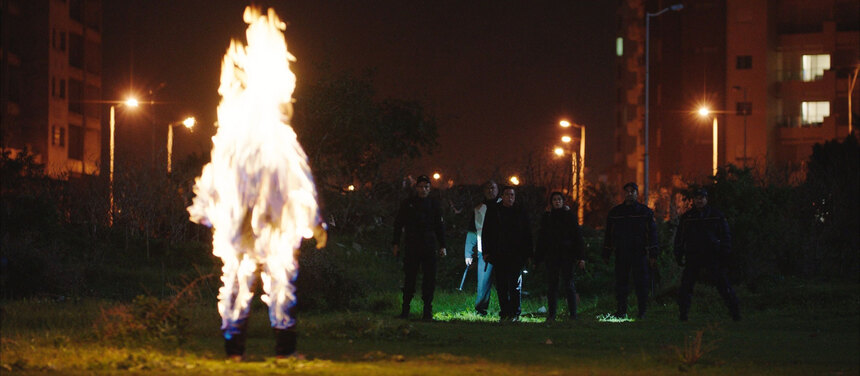Neuchâtel 2022 Review: ASHKAL, Fire Without End

If a person sets themselves alight and no one sees it, does the act lose its meaning? Is a half-built housing complex still a potential home, or a constant reminder of impermenance? Can justice be served only through the law, or do we need an avenging angel? And what if that angel is beholden only to their own desire to set anyone on fire?
Youssef Chebbi's solo feature directorial debut, Ashkal, is a dark and subtle supernatural thriller, a deft combination of neo-noir and the fantastic. Perhaps the only effective way to relate the socio-political tension of contemporary Tunisia, its story moves like shadow through the flames that greet the characters, its confrontation simultaneous cold and searing, right to the skin.
In an area known as the Garden of Carthage, a body is found, burned to death, in an abandoned construction site. This neighbourhood, a development that was halted with the Arab Spring, has slowly resumed its growth, but many buildings are still merely husks. And someone is stalking them, first with this security guard, then with the maid of a rich family. Forensics and witnesses indicate that these people were given a flame by a stranger, and simply allowed themselves to immolate, not even instinctually moving against their own destruction. Their only connection seems to be an amateur video of someone who self-immolated on a busy street, seemingly in political protest.
Detectives Fatma (Fatma Oussaifi) and Batal (Mohamed Houcine Grayaa) are assigned to the case, and seem to only get answers that lead to more questions. It doesn't help that Fatma's father is leading a commission to investigate crimes of violence committed by the police under the old regime, leaving Batal to smooth things over. He seems content that these people killed themselves, and doesn't much care why. Fatma knows there is something strange moving in the shadows of these buildings, something perhaps not entirely natural.
There are crowds in the streets, fighting for their newfound rights, but that is far from the world of this story. In this still mostly unoccupied section of Tunis, the half-built structures stand like lonely bones, imposing and cold; whomever, or whatever, is bringing fire to this place does so only for flesh. Fatma explores these spaces like a ghost, occasionally encountering other ghosts: the poor hired to watch these empty spaces, the lonely with nowhere else to go.
Self-immolation seems an odd choice for suicide in a place where the fire would hardly be seen by anyone - so what is this devil setting people on fire? What spell is it putting these people under? Is this a distraction from or a reaction to a political situation in which the same people lose over and over? Fatma is trying to solve the case, and yet she is ostracized; Batal is trusted in the force, and yet he seems to be moving against it. With much of the story set at night, it is the only safe time for these individuals to move, to work in the shadows of the literal and metaphorical collosi - and yet, this emptiness that surrounds them seems to reflect their inner life.
There are several scenes (maybe a few too many) of characters contemplating this urban wasteland. Cinematographer Hazem Berrebah makes you feel the stature of these buildings like a low vibration stretching into the audience; you can see how something supernatural might be lurking, but the fire is such a contrast to the grey concrete. And without signs, these buildings and their spaces are mazes in which to get lost, as Fatma searches for the truth, and Batal tries to hide his. But the more gthey investigate, the stranger the case becomes; Fatma knows that, should the person responsible be outside the law, there is nothing she can do to stop them.
The final shots of the film are riveting, to say the least, haunting and deeply disturbing. Ashkal asks far more questions than it answers, befitting a kind of neo-noir that knows most mysteries will never be solved to satisfaction, too many unjustices will go unanswered, and even the cleanse of fire might never be enough.








